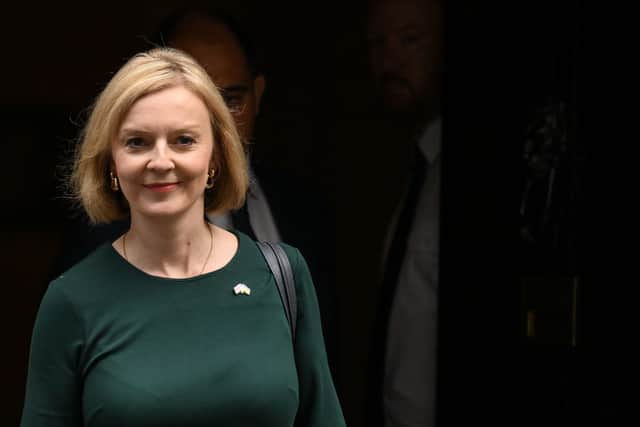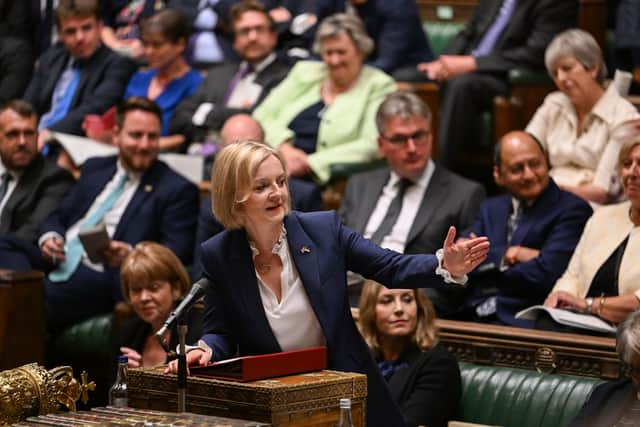Cost of living: new Prime Minister Liz Truss will freeze energy bills at £2,500 for two years
and live on Freeview channel 276
Prime Minister Liz Truss today announced her “bold” plan to freeze energy bills for up to two years, to guard households and businesses against crippling costs.
She told MPs in the House of Commons that the energy price cap will be frozen at £2,500 a year for a typical home, stopping it from rising to £3,549 in October and around £5,000 in January.
Advertisement
Hide AdAdvertisement
Hide AdThe plan will last for two years from 1 October, and will reportedly save the average household £1,000 a year amidst the spirally cost of living crisis.
It comes in addition to the £400 energy bills discount that the Government previously announced.
New Chancellor Kwasi Kwarteng will set out the expected costs of the energy package in a fiscal statement later this month, amid growing concerns about the amount of borrowing needed to pay for the plan - which is reported to potentially be up to £150 billion.
Sir Keir Starmer called again for a windfall tax, with Labour accusing the PM of writing a “blank cheque” to energy giants by ruling out the levy.


Advertisement
Hide AdAdvertisement
Hide AdHe said: “We’ve been calling for a windfall tax since January, and we want to see it expanded. The consequence is the bill will be picked up by working people.”
Conservatives pointed out that a windfall tax is already in place, but Labour have argued it is not sufficient and includes an “absurd loophole.”
Ms Truss said she would not give in to calls to expand the policy - which would see bigger taxes on the bumper profits being made by oil and gas companies.
The Treasury estimates that energy companies could make £17 billion in unexpected profits over the next two years.
‘Extraordinary times call for extraordinary measures’
Advertisement
Hide AdAdvertisement
Hide AdOther measures announced include suspending the green levy on energy bills, and setting up a fund for people who do not get their energy through traditional means - such as those who use heating oil.
The South West Norfolk MP said: “We will also put in place long-term measures to secure future supplies of energy at more affordable rates, so that we are never in this position again.”
Ms Truss said she wants to accelerate supplies of all sources of energy, including more nuclear energy, a lift on the fracking ban and new North Sea oil and gas contracts for exploration - adding that “extraordinary times call for extraordinary measures”.
Businesses will also be getting a support package for six months which will provide “equivalent support”, with further support targeted at “vulnerable industries” after the initial period, the Prime Minister said.
Loading....
Advertisement
Hide AdAdvertisement
Hide AdMr Starmer argued that the plans were not sufficient to ease the cost of living crunch, adding that “Britain needs a fresh start.”
He continued: “The change we need is not the fourth Tory prime minister in six years, but a Labour Government.”
‘Bold plan of action’
Ahead of Thursday’s announcement, Ms Truss acknowledged families and businesses across the country are concerned about how they will “make ends meet” over the coming months.
She blamed rising global prices on Russian president Vladimir Putin’s war in Ukraine and “weaponisation” of gas supply in Europe.
Advertisement
Hide AdAdvertisement
Hide Ad“This has only made clearer that we must boost our long-term energy security and supply,” she said.
“We will take action immediately to help people and businesses with bills but also take decisive action to tackle the root cause of these problems, so that we are not in this position again.


“We will set out our plans to deliver on that promise and build a prosperous Britain for everyone.”
Downing Street said the new PM would set out a “bold plan of action to support people across the UK” while also “ramping up domestic energy supply”.
Advertisement
Hide AdAdvertisement
Hide AdGoing head-to-head with Sir Keir Starmer at her first Prime Minister’s Questions, Ms Truss confirmed she would make an announcement on her cost-of-living proposals to the House on Thursday.
‘Blank cheque to oil and gas giants’
However, she faced accusations she was dodging scrutiny over the way her plans would be presented to Parliament.
She will open a debate on energy costs but, unlike a formal ministerial statement, this will not result in sustained questioning from MPs about the move.
Advertisement
Hide AdAdvertisement
Hide AdShadow climate change secretary Ed Miliband argued that “core” to any solution is the question of “who pays”.


“By ruling out a windfall tax, Liz Truss, in one of her first acts as Prime Minister, has written a blank cheque to the oil and gas giants making £170billion in excess profits, and the British people will foot the bill,” he said.
“Every penny her Government refuses to raise in windfall taxes is money that they will be loading onto the British people for years to come.”
On Wednesday, the Prime Minister’s official spokesman said the existing windfall tax imposed under Mr Johnson still stands, despite Ms Truss’s opposition to such levies.
Fracking and North Sea oil
Advertisement
Hide AdAdvertisement
Hide AdDowning Street also indicated the moratorium on fracking in England could be lifted in the energy package, despite the 2019 Conservative manifesto opposing an end to the ban without science showing it can be done safely.
Ms Truss vowed during her leadership campaign that she would end opposition to shale gas extraction in places where it is backed by local communities.
Oil firms will also be encouraged to exploit existing reserves in the North Sea, with as many as 130 oil and exploration licences likely to be awarded.
However neither resource will yield quick results, as it can take almost a decade for new wells to become operational and fracking sites will be subject to lengthy planning inquiries.
Comment Guidelines
National World encourages reader discussion on our stories. User feedback, insights and back-and-forth exchanges add a rich layer of context to reporting. Please review our Community Guidelines before commenting.